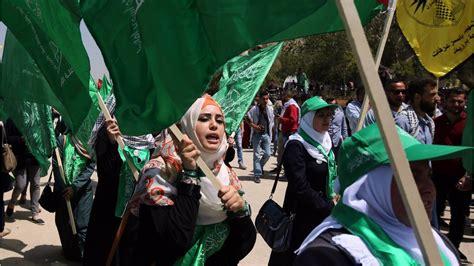
Officials, observers warn Muslim Brotherhood is inciting pro-Hamas demonstrations
Jordanian officials and observers say the Muslim Brotherhood and its offshoot, Hamas, are inciting pro-Hamas demonstrations with the aim of destabilizing Jordan, a key U.S. Arab ally.
Jordan has been the scene of largely peaceful but growing protests since the start of the Gaza war. Many of the demonstrations have been near the Israeli Embassy in the capital, Amman.
Some demonstrators demand Jordan ends its 1994 peace treaty with Israel, while others voice anger against Israel as they share personal ties with Gazans suffering bombardment and starvation.
Saud Sharafat, a former senior member of Jordanian intelligence and a terrorism analyst, believes some Hamas leaders — and Iran — would like to portray the Jordanian government as “resisting the will of the street.” But authorities in Jordan “have displayed skill in allowing protesters to test the limits of dissent, while also maintaining public order,” he told United Arab Emirates’ The National newspaper.
Recently, several prominent Jordanian government officials as well as journalists have accused the Muslim Brotherhood and its offshoot Hamas of inciting the population against the governing authorities. They say this is done in the service of Iran, which seeks to destabilize Jordan and widen the conflict. Jordan has the longest land border with Israel and the majority of its population is of Palestinian origin.
Jordanian analyst Amer Al Sabaileh told VOA that Hamas leaders have specifically targeted Jordan rather than other Arab countries in their speeches, inciting Jordanians to go to the streets.
He questions why protests continue when Jordan’s King Abdullah has repeatedly called for a cease-fire and has been at the forefront of humanitarian aid deliveries, while Jordan’s foreign ministry has criticized Israel’s prosecution of the war.
“There is a political purpose behind mobilizing and insisting that it is legitimate to go to the streets in Jordan, because they are originally Palestinian,” he said. “So, if you are originally Palestinian, it does not give you the right to bring chaos to Jordan or to import the crisis inside a stable country that has also a fragile security situation because this country, since 2003, has been living with threats from Iraq, Syria, terrorism, drugs. We should care about how stable Jordan should be.”
Meanwhile, analyst Osama Al Sharif told VOA that while the Jordanian government may be disturbed by the slogans and spread of the protests, he believes claims of the Muslim Brotherhood and Hamas making inroads in Jordan is “hyperbole,” nor has there been physical proof of Iran’s meddling.
“There have been certain thoughts on the internet. A pro-Iranian militia claiming that they can arm 12,000 Jordanians at any given moment. But it’s very difficult to separate truth from fiction when you have this highly charged atmosphere in Jordan with what’s happening in Gaza,” he said. “People are genuinely horrified because of family linkages, or have some sort of relationship, a distant relative, a friend. The king himself has overseen the delivery of aid to Gaza, toured the world defending the Palestinian cause and calling for a cease-fire and warning of a humanitarian disaster unfolding.”
Observers do agree, however, that great uncertainty prevails.
This, they say, is set to continue as the war in Gaza drags on, and while Israel mobilizes troops along its border with Lebanon in preparation for a possible war with Iran-backed Hezbollah.
Source » voanews.com





